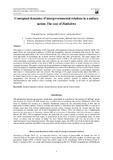Please use this identifier to cite or link to this item:
https://cris.library.msu.ac.zw//handle/11408/3805Full metadata record
| DC Field | Value | Language |
|---|---|---|
| dc.contributor.author | Chakunda, Vincent | - |
| dc.contributor.author | Ogochukwu, Nzewi | - |
| dc.contributor.author | Ijeoma, Edwin | - |
| dc.date.accessioned | 2020-07-22T06:56:00Z | - |
| dc.date.available | 2020-07-22T06:56:00Z | - |
| dc.date.issued | 2018 | - |
| dc.identifier.issn | 2224-574X | - |
| dc.identifier.uri | https://iiste.org/Journals/index.php/IAGS/article/view/40504 | - |
| dc.identifier.uri | http://hdl.handle.net/11408/3805 | - |
| dc.description.abstract | This paper is a critical examination of the conceptual differentiation of intergovernmental relations (IGR). The paper distils the conceptual boundaries of IGR and disqualifies classical scholarship that restricts the study, conception and application of the term to federal nations only, either as a conceptual synonym of federalism or a term applicable in articulating the relations between federal and state governments. The paper argues that classical scholars of the field restricted the conceptual breath of IGR to the philosophical traces of federalism while presenting a nebulous picture that such relations are not found in unitary nations. Such restriction has presented a theoretical liability to the field of IGR by confining its depth below its actual stretches as a field of reasoned discourse. This paper is based on twenty qualitative in-depth interviews conducted with key informants using the purposive sampling technique. Respondents were drawn from Ministers of State for Provincial Affairs, Members of Parliament, the judiciary, academia, civil society, permanent secretaries in government ministries and mayors of municipalities and city councils. The findings of the paper unequivocally places that IGR is a universal concept that extends beyond the dogmatic debate of federalism and unitarism as such relations are to be found wherever two or more governments interact in the development and execution of public policies and programmes. The necessity of IGR therefore cuts across political systems to address the disputes, interdependencies and spillover effects resulting from constitutional overlaps in all forms of governmental interaction. | en_US |
| dc.language.iso | en | en_US |
| dc.publisher | International Knowledge Sharing Platform | en_US |
| dc.relation.ispartofseries | International Affairs and Global Strategy;Vol. 60: p. 1-10 | - |
| dc.subject | Intergovernmental relations | en_US |
| dc.subject | Decentralisation | en_US |
| dc.subject | Unitary nation | en_US |
| dc.subject | Federal nation | en_US |
| dc.title | Conceptual dynamics of intergovernmental relations in a unitary nation: the case of Zimbabwe | en_US |
| dc.type | Article | en_US |
| item.openairecristype | http://purl.org/coar/resource_type/c_18cf | - |
| item.languageiso639-1 | en | - |
| item.grantfulltext | open | - |
| item.openairetype | Article | - |
| item.cerifentitytype | Publications | - |
| item.fulltext | With Fulltext | - |
| Appears in Collections: | Research Papers | |
Files in This Item:
| File | Description | Size | Format | |
|---|---|---|---|---|
| Conceptual dynamics of intergovernmental.pdf | Abstract | 130.22 kB | Adobe PDF |  View/Open |
Page view(s)
182
checked on Feb 21, 2026
Download(s)
48
checked on Feb 21, 2026
Google ScholarTM
Check
Items in MSUIR are protected by copyright, with all rights reserved, unless otherwise indicated.



